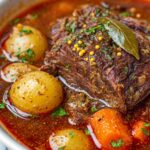Description
Sauerbraten is a classic German pot roast featuring a tender beef roast marinated for several days in a flavorful mixture of red wine vinegar, spices, and vegetables. This slow-cooked dish is seared to perfection, simmered until fork-tender, and served with a rich, tangy gravy thickened with gingersnap cookies. Ideal for a comforting family meal, it pairs beautifully with traditional sides like red cabbage, boiled potatoes, or spaetzle.
Ingredients
Scale
Marinade
- 480 ml red wine vinegar or a mixture of red wine and vinegar
- 480 ml water
- 1 large onion, sliced
- 2 carrots, chopped
- 2 celery stalks, chopped
- 2 cloves garlic, smashed
- 10 whole black peppercorns
- 4 whole cloves
- 2 bay leaves
- 1 teaspoon mustard seeds (optional)
- 1 tablespoon granulated sugar or brown sugar
Main
- 1.4–1.8 kg beef roast (bottom round or chuck)
- Salt, to taste
- Freshly ground black pepper, to taste
- 2 tablespoons neutral oil or butter, for searing
For Thickening Sauce
- 1–2 tablespoons flour (optional, for thickening)
- 8–10 gingersnap cookies, crushed
Instructions
- Prepare the marinade: In a large pot, combine the red wine vinegar, water, sliced onion, chopped carrots, chopped celery, smashed garlic cloves, black peppercorns, cloves, bay leaves, mustard seeds (if using), and sugar. Bring this mixture to a boil, then remove from heat and allow it to cool completely to room temperature.
- Marinate the beef: Place the beef roast in a large glass or ceramic dish. Pour the cooled marinade over the meat until it is fully submerged. Cover the dish and refrigerate for 48 to 72 hours, turning the meat once daily to ensure even marination.
- Prepare for cooking: Remove the beef roast from the marinade and pat it dry with paper towels. Strain the marinade to separate the liquid from the vegetables and spices; reserve both separately. Heat the neutral oil or butter in a Dutch oven over medium-high heat.
- Sear the beef: Once the oil is hot, sear the beef on all sides until it develops a deep brown crust. This helps lock in the flavors and juices. Transfer the seared meat to a plate temporarily.
- Sauté the vegetables: Using the same pot, add the strained vegetables from the marinade and sauté them for several minutes until aromatic and softened. This builds flavor for the cooking liquid.
- Simmer the roast: Return the seared beef to the pot. Pour the reserved marinade liquid over the meat, covering about two-thirds of the beef. Bring the mixture to a gentle simmer, then cover and cook on low heat for 2.5 to 3 hours, or until the meat is fork-tender. Alternatively, the covered pot can be placed in a preheated oven at 165°C (329°F) for the same duration.
- Rest the meat: Once tender, transfer the beef to a platter and let it rest to redistribute the juices, keeping it moist.
- Prepare the gravy: Strain the cooking liquid, discarding the solids, and return the liquid to the pot. Bring it to a simmer and whisk in the crushed gingersnap cookies (or flour if preferred) gradually until the sauce thickens and becomes smooth. Taste and adjust seasoning with salt, pepper, or a bit of sugar as needed.
- Serve: Slice the rested beef and serve with generous spoonfuls of the tangy gingersnap gravy. Traditional accompaniments include red cabbage, boiled potatoes, potato dumplings, or spaetzle to complete the authentic German meal.
Notes
- Marinating for at least 48 hours is crucial to tenderize the meat and develop the signature tangy flavor.
- Crushing gingersnap cookies into the sauce adds a unique sweetness and depth; alternatively, flour can be used to thicken the gravy.
- Searing the meat before slow cooking enhances flavor and texture.
- The dish can be cooked either on the stovetop over low heat or in the oven at a moderate temperature; both yield tender results.
- Traditional side dishes like red cabbage and spaetzle complement the sour and rich flavors perfectly.
- Use a heavy-bottomed pot or Dutch oven for even heat distribution during cooking.

